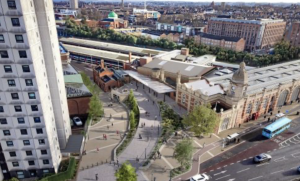Action demanded to unpick fast fashion’s modern slavery problems

An influential think tank has called for “root and branch reform” of the “corrupt system” that has created modern slavery conditions in parts of Leicester’s textile industry.
The Centre for Social Justice (CSJ) has argued that urgent action is required to “restore rule of law, fair labour conditions and dignity to the exploited”.
“The inhumane treatment of factory workers in Leicester East has been a well-known secret for decades,” it said.
“We must keep up the pressure to transform working practices in the garment industry – especially as conditions in Leicester’s factories may well be replicated in other garment industries across Blackpool, Burnley, Oldham and parts of Manchester.”
The centre-right thinktank, which was co-founded by former Conservative Party leader Iain Duncan Smith, has been focused on the issues of modern slavery in the UK for a number of years.
Last month the CSJ called on the Government to “develop a new all-out assault on modern slavery”.
Its latest report, Parallel societies: slavery, exploitation and criminal subculture in Leicester, looks into the particular problems of the fast fashion industry in the East Midlands city.
Leicester has been thrust into the spotlight once more because of investigations into the causes of a spike in coronavirus cases, which led to a local lockdown, and work by an undercover reporter for the Sunday Times into Boohoo’s supply chain.
The report’s authors said: “Our research has confirmed that conditions in the garment factories in Leicester East exemplify a wide spectrum of criminality and exploitation, described by Seema Malhorta MP as ‘the new front of modern slavery’.
“There is urgent need for action before a tragedy along the lines of the collapse of the Rana Plaza building in Dhaka, Bangladesh, which housed five garment factories, killing more than 1,100 people, happens on our shores and on our watch.”
The report highlights how a combination of the “close knit nature” of the community, and the racism and isolation that it says many have experienced, make it difficult for people to speak out.
This is made worse for those who do not speak English, and therefore do not “understand their rights” while also making it difficult to “raise concerns with those charged to protect them”.
The CSJ’s research found cases of homeworkers – who often live in houses owned by their employer – that are paid £2 an hour and factory workers earning £175 for a 50-hour week.







